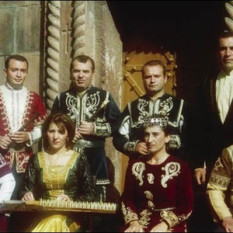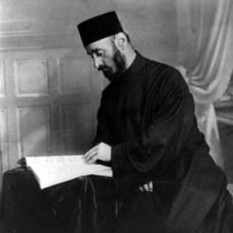Sayat-Nova (Armenian: Սայաթ-Նովա; Persian/Azeri: سایاتنووا; Georgian: საიათ-ნოვა) (14 June 1712, Tiflis – 22 September 1795, Haghpat), meaning 'King of Songs', was the name given to the Armenian poet and ashik Harutyun Sayatyan. His mother, Sara, was born in Tbilisi, and his father, Karapet, either in Aleppo or Adana. He was skilled in writing poetry, singing, and playing the kamancheh. He performed in the court of Heraclius II of Georgia, where he also worked as a diplomat and, apparently, helped forge an alliance between Georgia, Armenia and Shirvan against the Persian Empire. He lost his position at court when he fell in love with the king's daughter, and spent the rest of his life as an itinerant bard. In 1795 he was killed in Haghpat monastery by the army of Agha Mohammed Khan.
About 220 songs can be attributed to Sayat-Nova, although he may have written thousands more. Most of his extant songs are in Armenian, Georgian, Azeri Turkic and Persian. A number of them are sung to this day. He was also fluent in Arabic.
Sayat-Nova is considered by many to be the greatest ashik (folk singer-songwriter) that ever lived in the Caucasus. Composer Alexander Arutiunian wrote an opera called "Sayat Nova". There is a street and a music school named after him in Yerevan, Armenia, as well as an Armenian-American dance ensemble in the United States, and a pond located in Mont Orford, Quebec, Canada.
Sergei Parajanov's 1968 film "Sayat Nova" (a.k.a. The Colour of Pomegranates) - which was banned in the Soviet Union - follows the poet's path from his childhood wool-dying days to his role as a courtier and finally his life as a monk. It is not so much a biography of Sayat Nova but a series of tableaux of Armenian costume, embroidery and religious ritual interspersed with scenes and verses from the poet's life. The soundtrack was composed by Tigran Mansurian.
.
You can find information through the best music search engine - Muzlan.top 😊All materials on request "Sayat Nova" are available on page Sayat Nova
Yes of course. You can listen tracks on the page Sayat Nova
Yes of course. You can download tracks on the page Sayat Nova
This page is found by queries: Sayat Nova track minus, Sayat Nova mp3 download, Sayat Nova songs download, Sayat Nova song download, Sayat Nova all mp3


